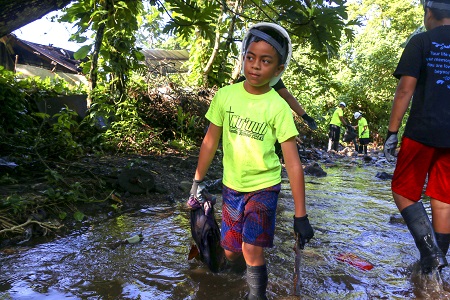
A youth group member of the Nuuuli CCCAS carries trash and debris from Vaitele Stream in Nuuuli during the ASCC-ACNR Forestry Program’s Nuuuli Watersheds Restoration stream cleanup activity in May. (Photo: D. Helsham ASCC-ACNR)

A youth group member of the Nuuuli CCCAS carries trash and debris from Vaitele Stream in Nuuuli during the ASCC-ACNR Forestry Program’s Nuuuli Watersheds Restoration stream cleanup activity in May. (Photo: D. Helsham ASCC-ACNR)
ASCC-ACNR Forestry Program completes Landscape Scale Restoration Project in Nuuuli
May 30, 2018
By Daniel Helsham, ASCC-ACNR
The American Samoa Community College (ASCC) - Agriculture, Community and Natural Resources (ACNR) Division’s Forestry Program hosted the first phase of its Landscape Scale Restoration (LSR) project with restoration activity for the watersheds in Nuuuli on May 19 and May 26, 2018. “The purpose of this project is to restore the Nuuuli Watersheds through stream debris removal, native tree planting, and conservation education efforts,” said Acting Forestry Program Manager Denis Sene, Jr.
The purpose of the LSR grant program, under the U.S. Forest Service of the USDA, is to provide financial and technical assistance to areas in need of restoration, protection, and conservation. To restore the watersheds in Nuuuli, stream cleanup activities were planned for the last two Saturdays in May. The first stream cleanup was at the Nuuuli Papa Stream located near Family Mart, and the second took place at the Vaitele Stream located north of the Tafuna Correctional Facility.
Over 230 youth group volunteers from the Nuuuli Catholic, CCCAS, Methodist, and Nazarene churches participated in the stream cleanups. Reverends from the various denominations served as points of contact for their churches and were of great help during the implementation, even helping the volunteers collect trash from the streams. Environmental agency partners such as the Environmental Protection Agency (EPA), Department of Marine Wildlife Resources (DMWR), Coral Reef Advisory Group (CRAG), and the National Park of American Samoa (NPAS) also assisted.
The combined efforts of everyone involved led to a collection of approximately 2.5 tons of debris from the streams during the two cleanups. The ASCC-ACNR Forestry Program staff also planted 8 Malili trees and 25 vetiver grass plugs along the stream corridors and stream banks to help control soil erosion along the slopes. Following each cleanup, ASCC-ACNR Forestry Program LSR student interns gave a presentation on the functions and the importance of watersheds. Participants learned about the social, health, and ecological benefits watersheds provide and the impact they have on forests and marine species.
The ASCC-ACNR Forestry Program consists of three divisions: Forest Health Protection - Invasive Plants, for forest health activities, monitoring, and reporting on the health of all forest lands; Forest Stewardship, for assisting landowners with forest and wetlands management; and Urban and Community Forestry, for management of trees and forests within populated areas from small villages to large cities, community outreach and tree planting. Each program is dedicated to the protection, conservation and restoration of forests in American Samoa.
The ASCC-ACNR acknowledges the support of ASCC President Dr. Rosevonne Makaiwi-Pato, EPA Director Ameko Pato, DMWR Director Va’amua Henry Sesepasara, the NPAS Superintendent Scott Burch and the Executive Director of the Arts Council, Dr. Mary Taufete'e, for their assistance with the LSR project, and extends its appreciation to all those who participated in the Nuuuli Watershed Restoration event. For more information on the LSR project or the ASCC-ACNR Forestry Program, call 699-1575 ext. 249.
